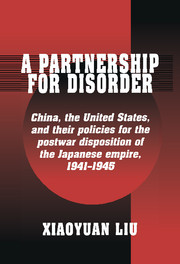 A Partnership for Disorder
A Partnership for Disorder Book contents
- Frontmatter
- Contents
- Acknowledgments
- Note on romanization
- Abbreviations
- Introduction
- 1 The making of an alliance
- 2 The issue of postwar Japan
- 3 China's lost territories
- 4 Korea's independence
- 5 The road to Cairo
- 6 A divisive summit
- 7 Yan'an and postwar East Asia
- 8 Diplomacy without action
- 9 Erosion of a partnership
- 10 The Manchurian triangle
- 11 Bargaining at Moscow
- 12 Epilogue: The crisis of peace
- Appendix I Guiding Plan for Helping the Korean Restoration Movement
- Appendix II Two Chinese documents of the Cairo Conference
- Bibliography
- Index
2 - The issue of postwar Japan
Published online by Cambridge University Press: 20 October 2009
- Frontmatter
- Contents
- Acknowledgments
- Note on romanization
- Abbreviations
- Introduction
- 1 The making of an alliance
- 2 The issue of postwar Japan
- 3 China's lost territories
- 4 Korea's independence
- 5 The road to Cairo
- 6 A divisive summit
- 7 Yan'an and postwar East Asia
- 8 Diplomacy without action
- 9 Erosion of a partnership
- 10 The Manchurian triangle
- 11 Bargaining at Moscow
- 12 Epilogue: The crisis of peace
- Appendix I Guiding Plan for Helping the Korean Restoration Movement
- Appendix II Two Chinese documents of the Cairo Conference
- Bibliography
- Index
Summary
Twenty days before the Pearl Harbor attack, Chiang Kai-shek delivered a speech to the People's Political Council (a body established in 1938 by the KMT government to symbolize national unity), asserting that it was time for the world to “settle the Japanese problem.” Chiang broached this theme to the world as an antithesis to the Japanese propaganda that the conflict in East Asia was caused by a “China incident.” He contended that to achieve lasting peace in Asia, Japan must be forced to relinquish its ambition for hegemony in the region, to withdraw its troops from all overseas territories acquired by force, and to readjust its international alignment by shifting to the side of the democracies. What Chiang hoped to achieve was nothing less than the dissolution of the Japanese Empire. When the Chinese government began its “victory planning” after Pearl Harbor, the subject of the postwar treatment of Japan and its empire was formally listed in Chongqing's postwar agenda. Meanwhile, across the Pacific, the U.S. government also quietly launched its postwar planning for Japan. During the first two years of the Pacific war, although Chongqing and Washington became allies in the hostilities, the two governments were slow to forge a working relationship with regard to the postwar disposition of Japan. Actually, in this period, Chongqing's and Washington's postwar planning for Japan followed their own paths, and consultations between them on the subject rarely occurred.
- Type
- Chapter
- Information
- A Partnership for DisorderChina, the United States, and their Policies for the Postwar Disposition of the Japanese Empire, 1941–1945, pp. 37 - 54Publisher: Cambridge University PressPrint publication year: 1996


